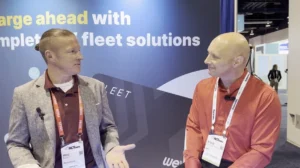Getting Technical: Flying in Green Skies
Aviation contributes to 2% of all CO2 emissions, which is something the industry wants to change. Jason Riggs, director of strategy at Technetics, spoke with Tyler Kern about some of the aviation industry’s plans to reach zero emissions by 2050 through sustainable aviation fuels (SAFs), hydrogen, and pure battery-electric aircraft.
Hydrogen as a fuel source gets talked about a lot; however, until recently, it has been mostly all talk. “There are a couple of different ways you can use hydrogen to power an aircraft,” Riggs said. “One would be to burn hydrogen in the turbo engine. The second way would be to use hydrogen in a fuel cell. The fuel cell creates electricity, and the electricity then powers electric motors. And lastly, hydrogen can also be used to manufacture sustainable aviation fuels.” This all sounds great, but what’s the hang-up?
“The challenge is when you start adding in weight of the storage tanks, and all the weight required to hold that hydrogen, that energy density drops by roughly a third to two-thirds,” Riggs said. “It’s not a perfect solution even though hydrogen in and of itself has a higher energy density than some of these competing technologies.” The technology exists to make hydrogen-fueled aircrafts a reality, but its drawbacks prevent it from being a scalable solution at present. Overall, however, it’s one that holds promise for the future.
Getting to zero emissions is more than just the emissions coming out of the jet; the production of green fuels counts too, and the industry is looking at ways to balance out both ends. Producing hydrogen fuels today is more expensive than producing traditional kerosene jet fuels. Bringing costs down will be another factor in moving the industry forward in its path toward green, and government incentives could help move the needle. However, without such intervention, green-fuel initiatives may not stand a fighting chance.









